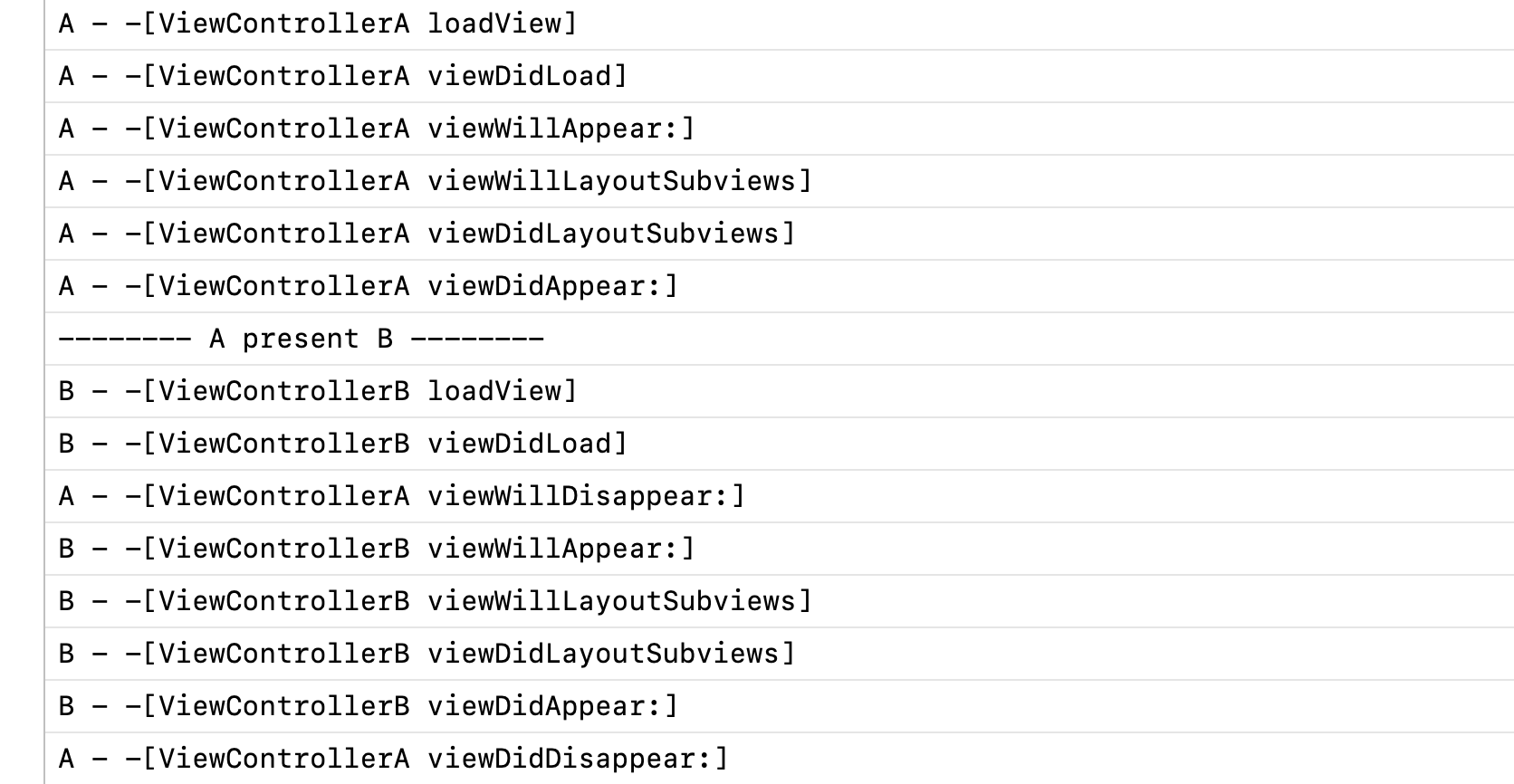概念
在iOS中一般有两种ViewController,一类是用于显示内容的,比如UIViewController,UITableVIewController或者自定义的VC等,另一类是容器型的控制器,如UINavigationController(内部维护一个栈,前面博客中有所讲解,用push,pop进行控制),UITabBarController(内部维护一个数组)等
内容型 VC = 页面本身(展示内容和逻辑)
容器型 VC = 用来管理多个内容 VC 的关系(栈 or 数组)
生命周期
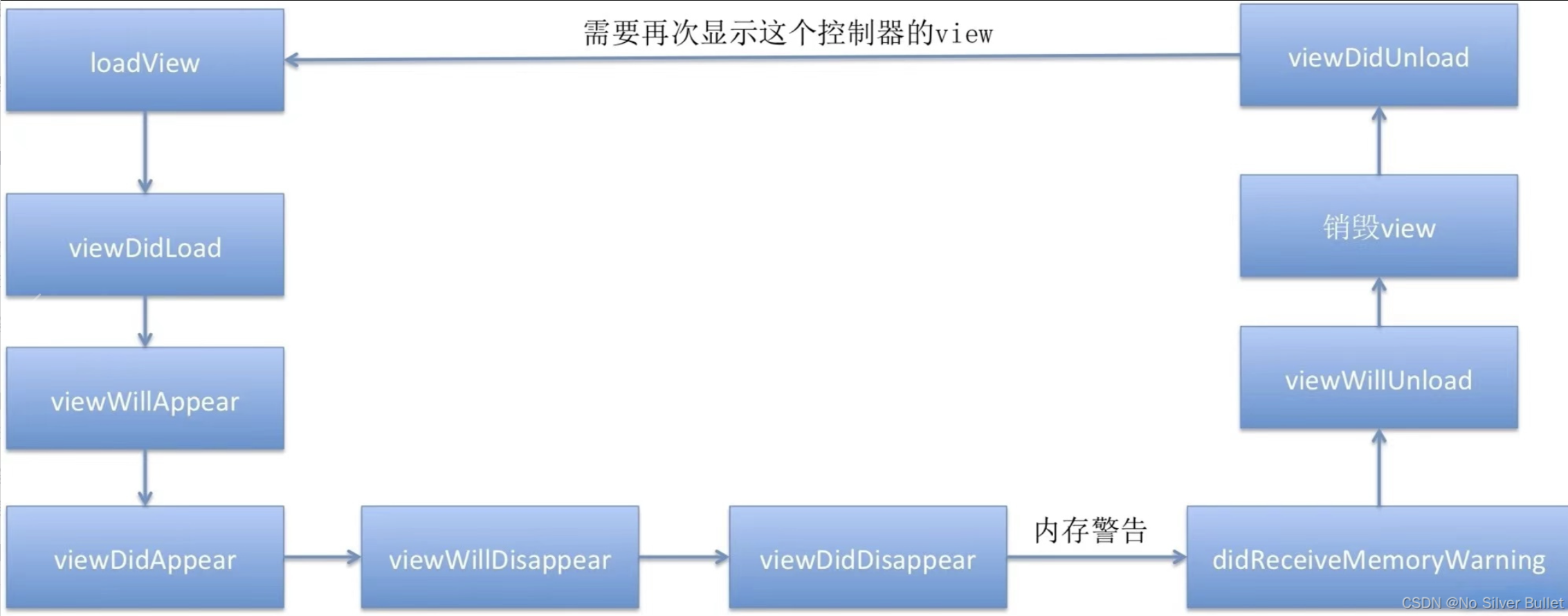
函数
- init:初始化程序
- loadView:在UIViewController对象的view被访问且为空时调用
- viewDidLoad:视图加载完成后调用,进行如控件的初始化之类的操作,在这个控制器销毁之前只会调用一次该方法
- viewWillAppear:视图即将展现时调用
- viewWillLayoutSubviews:即将开始子视图位置布局
- viewDidLayoutSubviews:用于通知视图的位置布局已经完成
- viewDidAppear:视图已经出现时调用
- viewWillDisappear:视图即将消失
- viewDidDisappear:视图已经消失
- dealloc:视图被销毁
周期函数的调用顺序
我们具体调用控制器推出另一个控制器时的具体方法有两种,一个是push方法,另一个是present方法,他们的具体调用顺序调用我们在下面演示一下
push/pop
#import "ViewControllerA.h"
#import "ViewControllerB.h"
@interface ViewControllerA ()
@property (nonatomic, strong) UIButton *pushButton;
@end
@implementation ViewControllerA
- (void)viewDidLoad {
[super viewDidLoad];
self.view.backgroundColor = [UIColor blueColor];
self.title = @"ViewController A";
NSLog(@"A - %s", __func__);
_pushButton = [UIButton buttonWithType:UIButtonTypeSystem];
[_pushButton setTitle:@"Push to B" forState:UIControlStateNormal];
_pushButton.frame = CGRectMake(self.view.frame.size.width / 2 - 100, 200, 200, 50);
_pushButton.backgroundColor = [UIColor whiteColor];
[self.view addSubview:_pushButton];
[_pushButton addTarget:self action:@selector(pushViewControllerB) forControlEvents:UIControlEventTouchUpInside];
}
- (void)pushViewControllerB {
ViewControllerB *b = [[ViewControllerB alloc] init];
NSLog(@"-------- A push B --------");
[self.navigationController pushViewController:b animated:YES];
}
- (void)loadView {
[super loadView];
NSLog(@"A - %s", __func__);
}
- (void)viewWillAppear:(BOOL)animated {
[super viewWillAppear:animated];
NSLog(@"A - %s", __func__);
}
- (void)viewWillLayoutSubviews {
[super viewWillLayoutSubviews];
NSLog(@"A - %s", __func__);
}
- (void)viewDidLayoutSubviews {
[super viewDidLayoutSubviews];
NSLog(@"A - %s", __func__);
}
- (void)viewDidAppear:(BOOL)animated {
[super viewDidAppear:animated];
NSLog(@"A - %s", __func__);
}
- (void)viewWillDisappear:(BOOL)animated {
[super viewWillDisappear:animated];
NSLog(@"A - %s", __func__);
}
- (void)viewDidDisappear:(BOOL)animated {
[super viewDidDisappear:animated];
NSLog(@"A - %s", __func__);
}
#import "ViewControllerB.h"
@interface ViewControllerB ()
@property (nonatomic, strong) UIButton *popButton;
@end
@implementation ViewControllerB
- (void)viewDidLoad {
[super viewDidLoad];
self.view.backgroundColor = [UIColor redColor];
self.title = @"ViewController B";
NSLog(@"B - %s", __func__);
// Pop 按钮
_popButton = [UIButton buttonWithType:UIButtonTypeSystem];
[_popButton setTitle:@"Pop to A" forState:UIControlStateNormal];
_popButton.frame = CGRectMake(self.view.frame.size.width / 2 - 100, 200, 200, 50);
_popButton.backgroundColor = [UIColor whiteColor];
[self.view addSubview:_popButton];
[_popButton addTarget:self action:@selector(popToViewControllerA) forControlEvents:UIControlEventTouchUpInside];
}
- (void)popToViewControllerA {
NSLog(@"-------- B pop A --------");
[self.navigationController popViewControllerAnimated:YES];
}
- (void)loadView {
[super loadView];
NSLog(@"B - %s", __func__);
}
- (void)viewWillAppear:(BOOL)animated {
[super viewWillAppear:animated];
NSLog(@"B - %s", __func__);
}
- (void)viewWillLayoutSubviews {
[super viewWillLayoutSubviews];
NSLog(@"B - %s", __func__);
}
- (void)viewDidLayoutSubviews {
[super viewDidLayoutSubviews];
NSLog(@"B - %s", __func__);
}
- (void)viewDidAppear:(BOOL)animated {
[super viewDidAppear:animated];
NSLog(@"B - %s", __func__);
}
- (void)viewWillDisappear:(BOOL)animated {
[super viewWillDisappear:animated];
NSLog(@"B - %s", __func__);
}
- (void)viewDidDisappear:(BOOL)animated {
[super viewDidDisappear:animated];
NSLog(@"B - %s", __func__);
}
运行结果
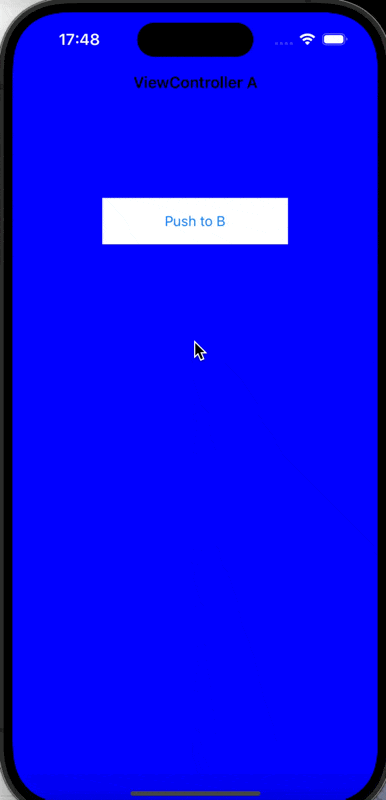
输出
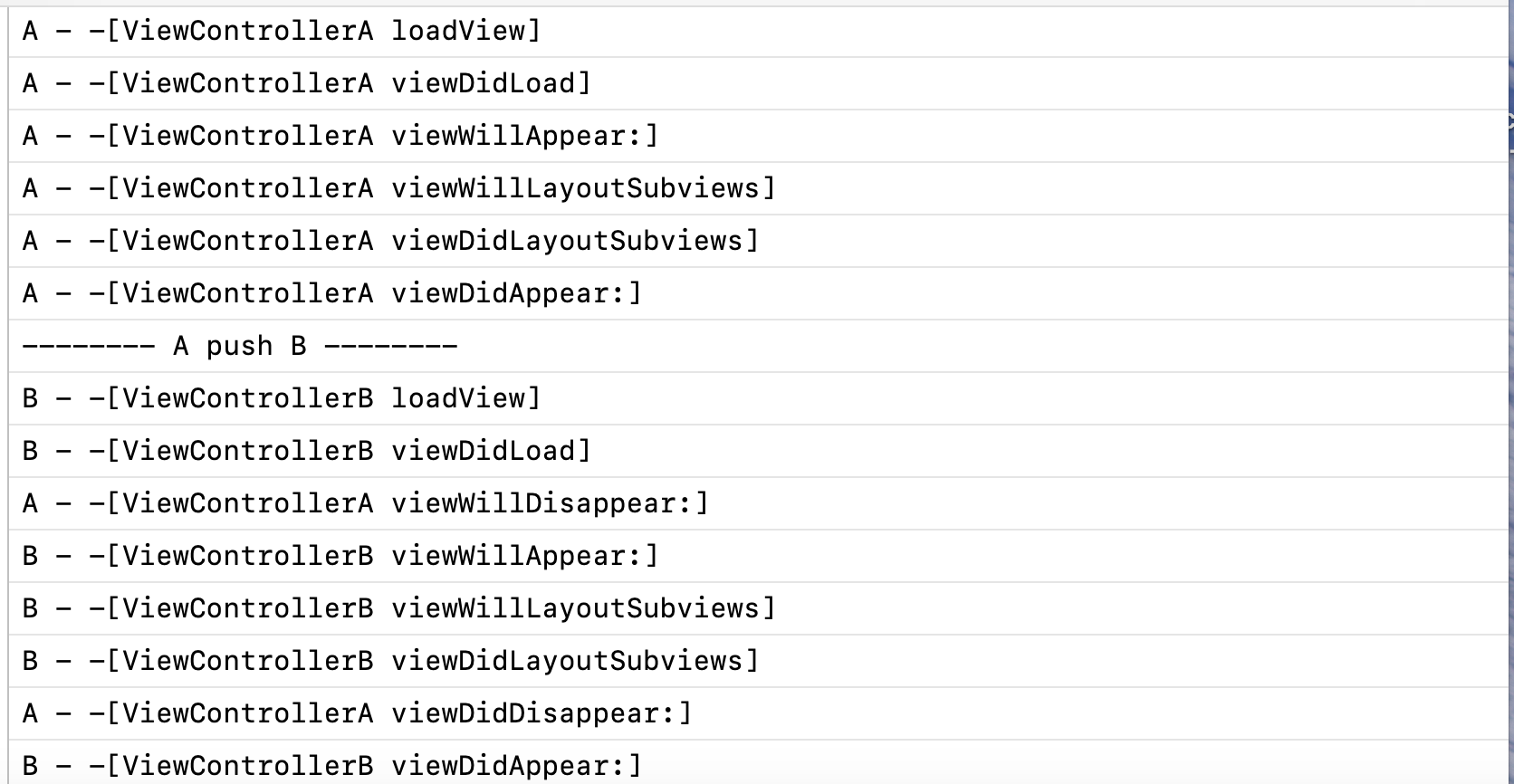

present/dismiss
#import "ViewControllerA.h"
#import "ViewControllerB.h"
@interface ViewControllerA ()
@property (nonatomic, strong) UIButton *presentButton;
@end
@implementation ViewControllerA
- (void)viewDidLoad {
[super viewDidLoad];
self.view.backgroundColor = [UIColor blueColor];
self.title = @"ViewController A";
NSLog(@"A - %s", __func__);
_presentButton = [UIButton buttonWithType:UIButtonTypeSystem];
[_presentButton setTitle:@"Present B" forState:UIControlStateNormal];
_presentButton.frame = CGRectMake(self.view.frame.size.width / 2 - 100, 200, 200, 50);
_presentButton.backgroundColor = [UIColor whiteColor];
[self.view addSubview:_presentButton];
[_presentButton addTarget:self action:@selector(presentViewControllerB) forControlEvents:UIControlEventTouchUpInside];
}
- (void)presentViewControllerB {
ViewControllerB *b = [[ViewControllerB alloc] init];
NSLog(@"-------- A present B --------");
b.modalPresentationStyle = UIModalPresentationFullScreen;
[self presentViewController:b animated:YES completion:nil];
}
- (void)loadView {
[super loadView];
NSLog(@"A - %s", __func__);
}
- (void)viewWillAppear:(BOOL)animated {
[super viewWillAppear:animated];
NSLog(@"A - %s", __func__);
}
- (void)viewWillLayoutSubviews {
[super viewWillLayoutSubviews];
NSLog(@"A - %s", __func__);
}
- (void)viewDidLayoutSubviews {
[super viewDidLayoutSubviews];
NSLog(@"A - %s", __func__);
}
- (void)viewDidAppear:(BOOL)animated {
[super viewDidAppear:animated];
NSLog(@"A - %s", __func__);
}
- (void)viewWillDisappear:(BOOL)animated {
[super viewWillDisappear:animated];
NSLog(@"A - %s", __func__);
}
- (void)viewDidDisappear:(BOOL)animated {
[super viewDidDisappear:animated];
NSLog(@"A - %s", __func__);
}
/*
#pragma mark - Navigation
// In a storyboard-based application, you will often want to do a little preparation before navigation
- (void)prepareForSegue:(UIStoryboardSegue *)segue sender:(id)sender {
// Get the new view controller using [segue destinationViewController].
// Pass the selected object to the new view controller.
}
*/
@end
#import "ViewControllerB.h"
@interface ViewControllerB ()
@property (nonatomic, strong) UIButton *dismissButton;
@end
@implementation ViewControllerB
- (void)viewDidLoad {
[super viewDidLoad];
self.view.backgroundColor = [UIColor redColor];
self.title = @"ViewController B";
NSLog(@"B - %s", __func__);
_dismissButton = [UIButton buttonWithType:UIButtonTypeSystem];
[_dismissButton setTitle:@"Dismiss to A" forState:UIControlStateNormal];
_dismissButton.frame = CGRectMake(self.view.frame.size.width / 2 - 100, 200, 200, 50);
_dismissButton.backgroundColor = [UIColor whiteColor];
[self.view addSubview:_dismissButton];
[_dismissButton addTarget:self action:@selector(dismissToViewControllerA) forControlEvents:UIControlEventTouchUpInside];
}
- (void)dismissToViewControllerA {
NSLog(@"-------- B dismiss A --------");
[self dismissViewControllerAnimated:YES completion:nil];
}
- (void)loadView {
[super loadView];
NSLog(@"B - %s", __func__);
}
- (void)viewWillAppear:(BOOL)animated {
[super viewWillAppear:animated];
NSLog(@"B - %s", __func__);
}
- (void)viewWillLayoutSubviews {
[super viewWillLayoutSubviews];
NSLog(@"B - %s", __func__);
}
- (void)viewDidLayoutSubviews {
[super viewDidLayoutSubviews];
NSLog(@"B - %s", __func__);
}
- (void)viewDidAppear:(BOOL)animated {
[super viewDidAppear:animated];
NSLog(@"B - %s", __func__);
}
- (void)viewWillDisappear:(BOOL)animated {
[super viewWillDisappear:animated];
NSLog(@"B - %s", __func__);
}
- (void)viewDidDisappear:(BOOL)animated {
[super viewDidDisappear:animated];
NSLog(@"B - %s", __func__);
}
/*
#pragma mark - Navigation
// In a storyboard-based application, you will often want to do a little preparation before navigation
- (void)prepareForSegue:(UIStoryboardSegue *)segue sender:(id)sender {
// Get the new view controller using [segue destinationViewController].
// Pass the selected object to the new view controller.
}
*/
@end
运行结果
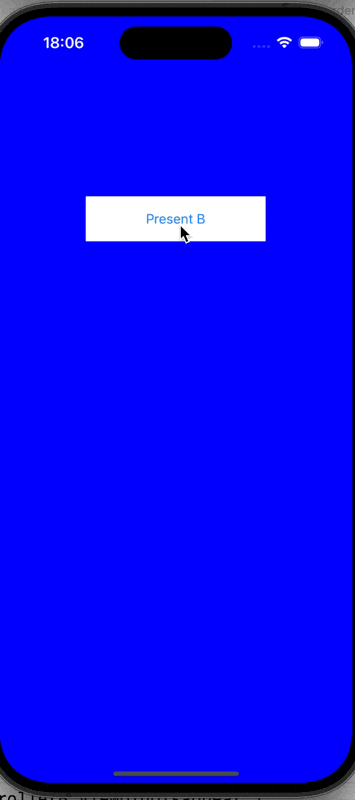
输出
